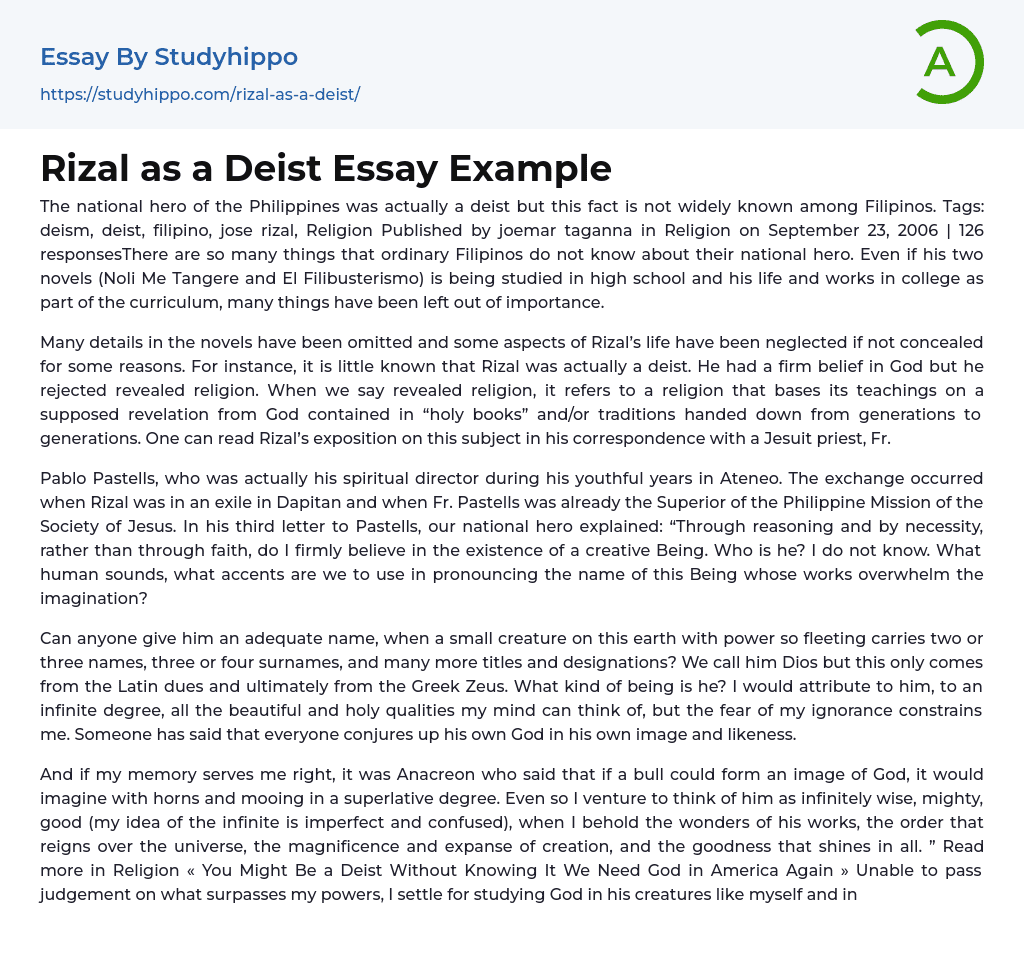Despite being widely studied in high school and college, many Filipinos are unaware that Jose Rizal, the national hero of the Philippines, was a deist. The novels he wrote (Noli Me Tangere and El Filibusterismo) provide insights into his life and works; however, important details about his religious beliefs are often overlooked.
The novels of Rizal have left out many details and disregarded certain aspects of his life, possibly for undisclosed reasons. Not widely known is the fact that Rizal identified as a deist, maintaining a strong belief in God but rejecting revealed religion. Rejected, specifically, is a religion that derives its teachings from a presumed revelation by God found in "holy books" and/or oral traditions passed down through generations. Rizal's discussions on this matter can be found in his le
...tters to Fr., a Jesuit priest.
During his time in exile in Dapitan, Rizal had a discussion with Fr. Pastells, his former spiritual director at Ateneo and the Superior of the Philippine Mission of the Society of Jesus. In his third letter to Fr. Pastells, Rizal discussed his belief in a creative Being based on reasoning and necessity rather than faith. However, he acknowledged that he did not know the identity or name to attribute to this awe-inspiring Being.
Can anyone give an appropriate name to a small creature on this earth who possesses such temporary power and is called by multiple names, surnames, and titles? We refer to him as Dios, which originates from the Latin word dues and ultimately from the Greek Zeus. What type of being is he? I would ascribe to him all the wonderful and sacred qualities that
my mind can imagine, but I am restrained by the fear of my lack of knowledge. It has been suggested that each individual envisions their own God based on their own appearance and characteristics.
According to Anacreon, if a bull could imagine God, it would picture Him with horns and mooing to the fullest extent. Personally, I perceive Him as infinitely wise, mighty, and good (although my understanding of the infinite is imperfect and confused). This perception arises when I witness the wonders of His creations, the orderly nature of the universe, the grandeur and vastness of existence, and the kindness that radiates from it all. Unable to judge what surpasses my capabilities, I choose to study God through His creatures, including myself, and through the inner voice of my conscience, which must have originated from Him. I strive to discern His will in everything around me and in the mysterious sentiment that emanates from within me. Above all else, I aim to refine this sentiment.
Therefore, Rizal's belief in a Deity was founded on rational contemplation of nature and conscience rather than on faith or divine revelation. In the same letter, Rizal voiced his skepticism towards the teachings of ancient sacred texts.
He expresses that religions assert to possess God's will condensed and documented in books and dogmas. However, he finds numerous contradictions, conflicting interpretations of words, and multiple obscure and untenable aspects within them. According to his conscience and reasoning, he cannot accept the notion that a wise fatherly figure, who has provided everything necessary for this earthly existence, would then conceal what is essential for eternal life in a language unfamiliar to others and
enshroud it behind metaphors and actions that contradict the fundamental laws of nature.
Is it possible that the one who causes the sun to rise and the air to blow, granting life to all, has also hidden from us what is necessary for our eternal existence? How should we view a father who spoils his children with treats and toys, but only supports the nourishment and education of one child? And what if this favored child refuses to eat while the others suffer in their quest for sustenance? However, Rizal clarifies that he simply rejects the notion of divine communication through old texts or traditions.
In his fourth letter to Fr. Pastells, he emphasizes his belief in the revelation of nature. Nature is seen by him as a powerful, eternal, incorruptible, clear, distinct, and universal voice that originates from God's own Being. This revelation speaks to us and permeates our existence throughout our lives. The question arises whether any other books can faithfully reveal God's work, goodness, love, providence, eternity, glory, and wisdom more than nature does. As it is written in the scriptures: "The heavens declare the glory of the Lord; and the firmament proclaims his handiwork."
Our national hero, who was undeniably intelligent and undoubtedly studied these matters thoroughly, developed a straightforward religious philosophy that became one of the cornerstones of the Filipino nation. This philosophy aligned with his aspirations for independence, academic, and religious freedom in our country.
- John Locke essays
- 9/11 essays
- A Good Teacher essays
- A Healthy Diet essays
- A Modest Proposal essays
- A&P essays
- Academic Achievement essays
- Achievement essays
- Achieving goals essays
- Admission essays
- Advantages And Disadvantages Of Internet essays
- Alcoholic drinks essays
- Ammonia essays
- Analytical essays
- Ancient Olympic Games essays
- APA essays
- Arabian Peninsula essays
- Argument essays
- Argumentative essays
- Art essays
- Atlantic Ocean essays
- Auto-ethnography essays
- Autobiography essays
- Ballad essays
- Batman essays
- Binge Eating essays
- Black Power Movement essays
- Blogger essays
- Body Mass Index essays
- Book I Want a Wife essays
- Boycott essays
- Breastfeeding essays
- Bulimia Nervosa essays
- Business essays
- Business Process essays
- Canterbury essays
- Carbonate essays
- Catalina de Erauso essays
- Cause and Effect essays
- Cesar Chavez essays
- Character Analysis essays
- Chemical Compound essays
- Chemical Element essays
- Chemical Substance essays
- Cherokee essays
- Cherry essays
- Childhood Obesity essays
- Chlorine essays
- Classification essays
- Cognitive Science essays




